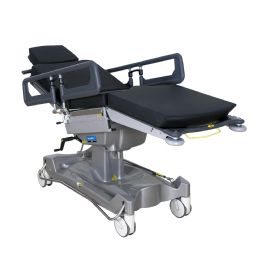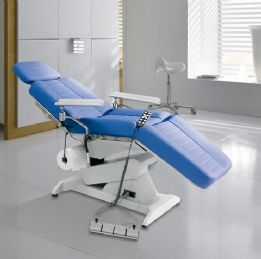
.jpg&newheight=260&quality=80)



The number of procedures performed in medical clinics is growing nationwide. These procedures can range from common bumps and lumps to complex aesthetic procedures. There are universal and specialty medical tables and exam chairs available for nearly every specialty and office procedure. A power procedure chair is designed to offer increased accessibility, versatile positioning, and enhanced patient comfort to allow a physician to perform procedures in the office or hospital comfortably and efficiently.
How is a Procedure Chair Designed?
A procedure chair, or table, that is ergonomically designed can be very helpful. It may have an extendable footrest so it can be easily adjusted for added patient comfort, better patient positioning, and access where it is needed most. A trim patient support surface, sleek base, and slim back and seat can provide greater accessibility to work closer to the patient with proper and ergonomic posture. Additionally, a tuck-away side rail can improve accessibility to the patient and can be easily extended for mounting accessories.
A procedure chair, or table, with power positioning can mean less strain and fatigue for the medical staff. A chair with height adjustment capabilities makes it easy to be used in a seated or standing position. One with powered multi-positioning movement of the back, seat, and tilt can give more flexibility of positioning the patient when it is required. A procedure chair with a barrier-free access and large range of motion can allow optimum positioning of patients so that they remain calm and relaxed. There are a variety of chair accessories available, such as an adjustable headrest to provide head and neck positioning with added support for the patient, leading to less movement during a procedure, and increased comfort.
What are the Different Types of Procedure Tables?
The type of procedure being done determines the type of procedure table required. Within each group of table styles there is a variation dependent upon each manufacturer’s innovations and designs. For example, a fracture table is used for setting broken bones or performing other orthopedic procedures, and there are several different styles of fracture tables. There are other specialty tables, such as bariatric tables for larger people and pediatric tables for smaller people.
Although standard procedure tables are still being used, specialty tables are becoming more popular. These tables often have radio translucent materials for the tabletop so the staff can use imaging equipment with them. Many procedure tables allow a C-arm imager to be used which standard tables cannot accommodate. Interchangeable head and foot sections, and sliding tabletops are other features that can allow imaging equipment to be used during a procedure.
Some procedures, such as kidney surgery, require a special table that commonly highlights sections called kidney elevators, and cutouts for kidney draining. Brain surgery generally requires a specialized table that is often referred to as a neuro table or a table with a neuro attachment. One of the most obvious changes in the population is that the average patient is heavier than his or her ancestors. Bariatric tables have advantages over the standard table, and one of them is the ability to hold heavier patients. Another advantage is that most bariatric tables have a low height. With the advancement of robotic procedures, is it useful to have a hydraulic table that can accommodate this equipment above the patient. A low procedure table also allows a physician to sit during the procedure, which is an advantage for procedures that may take hours to complete.
Some procedure tables combine two types into one table style. An example of this is the cardiac catheterization table that doubles as a cardiac operating table. Having the patient on the same table during both procedures saves time as well as reducing stress on both the patient and the staff.
Hulet Smith, OT
Rehabmart Co-Founder & CEO
lb